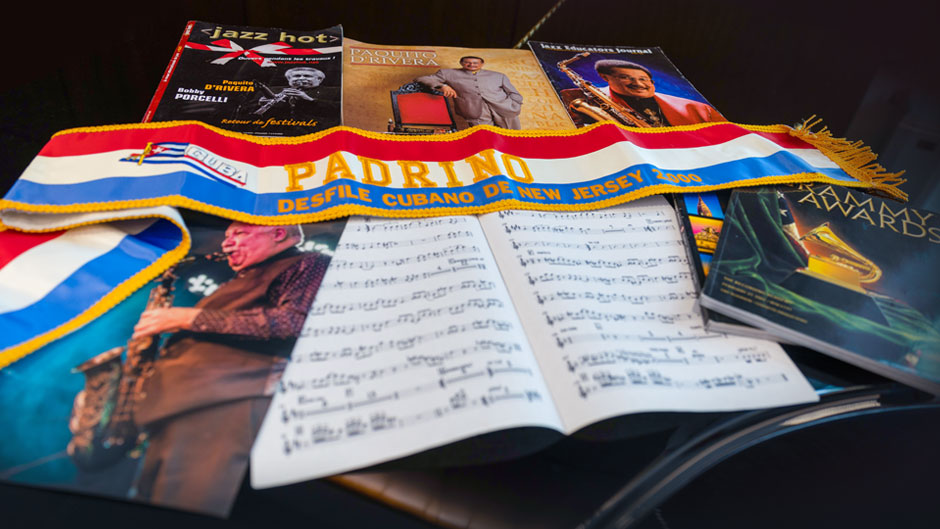When he was 10 years old, Paquito D’Rivera took to the stage with the National Theatre Orchestra in his native Cuba and wowed the audience with the way he interpreted songs on his saxophone.
Decades later and now living in the United States, the award-winning musician and composer has received 14 Grammys, recorded more than 30 albums, and has penned several books on music.
Earlier this year, he donated his archives to the University of Miami Libraries Cuban Heritage Collection at the Otto G. Richter Library.
“The Cuban Heritage Collection is honored to receive the Paquito D’Rivera archives. The collection will serve as an invaluable resource for students and scholars to learn from the creative process of a master musician whose innovative style has contributed so much to the promotion and performance of Latin and classical music genres,” said Amanda Moreno, interim Esperanza Bravo de Varona chair of the Cuban Heritage Collection.
Neatly organized in 10 archival boxes, the collection includes his musical scores, photographs, awards, and audiovisual materials. The papers show his professional trajectory, ranging from a photo of him playing as a 10-year-old boy to the programs for the ceremonies where he earned his Grammy Awards.
“Paquito is a consummate musician,” said Rey Sanchez, associate dean for strategic initiatives and innovations at the Frost School of Music. “I would put him at the level of any other giant in their genre on their instrument. You can compare him with any other saxophone player such as Cannonball Adderley or John Coltrane. He has his own style and his own artistic voice. He is a musician’s musician.”
Dafnis Prieto, an associate professor at the Frost School of Music, drummer, and composer, has played and toured with D’Rivera. Also born in Cuba, Prieto remembers that when he was studying at the National School of Music in Havana, D’Rivera was referenced by his teachers as a master of his craft.
“Paquito is an artist and a virtuoso of his instruments,” said Prieto. “His music transcends the notes on the page, and he tricks you into believing that what he is doing is easy.”
The archives—which include personal music scores of songs composed by the artist as well as reviews of D’Rivera’s many concerts—will serve as a great academic source for music students or lovers of jazz and Latin music, said Prieto.
“Any student can benefit from studying a person who has achieved so much in his profession,” said Prieto. “Every artist is a school in itself and students can gain a lot from their lives and their work.”
D’Rivera—who has played with many great musicians including John Birks “Dizzy” Gillespie, cellist Yo-Yo Ma, and trumpeter Wynton Marsalis—is also known for his contributions to classical music.
He reimagines the works of Mozart, Beethoven, and Chopin effortlessly in his performances. He also has played classical music with numerous orchestras, including the London Symphony Orchestra, Florida Philharmonic Orchestra, and the Simón Bolivar Symphony Orchestra.
“You don't have to be Austrian to play Mozart. All you need is some talent to start with and dedication. You have to study what happened in that period and find out why Mozart wrote that music, who were his contemporaries, and then you can become a specialist in Mozart, regardless [of] where you are from,” D’Rivera said in an interview.
Along with Cuban pianist and bandleader Jesus “Chucho” Valdes, D’Rivera also was the founder of the iconic jazz band Irakere in 1973. A June concert at the Adrienne Arsht Center for the Performing Arts in Miami featuring D’Rivera and Valdes drew a sold-out crowd.
Academics and students of music will be able to pore through the archives and study D’Rivera’s collection of musical scores that he composed, including “To Brenda With Love” (dedicated to his wife Brenda Feliciano) and “Gran Danzón” for flute and orchestra. The donated collection also includes many of the concert programs from his many performances spanning venues in Europe, Latin America, and the United States.
A meticulous collector, the musician’s archives even include train ticket stubs from a New York City to Philadelphia trip. One he took to receive an honorary degree from the University of Pennsylvania in May 2008.
Sanchez said that he believes that the D’Rivera archives will be invaluable to many who are interested in music, particularly jazz. Sanchez highlighted the incredible legacy and excellence of the musicians who have gone through the Frost School of Music jazz program, calling it “ground zero” for great musicians.
“Honestly, this is the natural home for his archives,” he said. “This is where they should be.”

